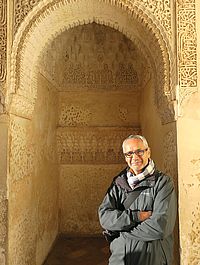Ahmad Baba, a late 16th/17th century West African intellectual, and his treatise on political theory: Acquiring blessings and repelling affliction by avoiding unjust rulers
احمد بابا التنبكتي
جلب النعمة و دفع النقمة بمجانبة الولاة الظلمة
Ahmad Baba Tinbukti’s Jalb al-ni'ma wa daf‘ al-niqma bi mujānabat al-wulāt al-ẓalama (Acquiring blessings and repelling affliction by avoiding unjust rulers)
Lecture by Shamil Jeppie (University of Cape Town & Wissenschaftskolleg zu Berlin)
Aḥmad Bābā (d.1627) is the most famous scholar from the West African desert-edge, town of Timbuktu, and probably the entire Sahara, in the late 16th and 17th century and beyond. When the Sa’adian rulers based in Marrakesh ordered the invasion of Timbuktu and other locations in its environs in the early 1590s Bābā was eventually captured and sent into exile in Marrakesh; his entire library was seized as well. Dozens of works are attributed to him but hardly any of his works have been edited and published or translated.
His two biographical dictionaries have always in use and have been edited. His fatwa (legal opinion) dealing with slavery has been edited and translated into English, and two other texts edited and translated into French. The availability of his material is obviously a challenge to a greater appreciation of his work.
In this presentation I shall focus on a neglected text of political theory by him titled Acquiring blessings and repelling affliction by avoiding unjust rulers that focuses on the relationship between scholars and rulers. This work has, as far as I can establish, never been closely studied, edited or translated. Why did he write it when he did? What are the specific texts he uses in the work? Do citations from them reveal what he had in his own collection? Was it one of the factors that led to his exile?
Shamil Jeppie is Associate Professor at the Department of Historical Studies at the University of Cape Town. He has worked on aspects of the social history of Cape Town and Durban, South Africa, and 19th-century Sudan. Shamil founded The Tombouctou Manuscripts Project in which he explored the formation of a culture of collecting in Timbuktu. He also led a National Research Foundation study group on history and the humanities in South Africa today. He has been the chairperson of the South-South Exchange Programme in the History of Development (Sephis), and is now the Director of HUMA, Institute for Humanities in Africa. In 2020/21, he is a fellow at Wissenschaftskolleg zu Berlin.
The event will be held via Zoom. Please register at registration@zmo.de.
Diese Veranstaltung gehört zur Vortragsreihe
Sommersemester 2021
ZMO-Kolloquium

Veranstaltungsdetails
ZMO / Online